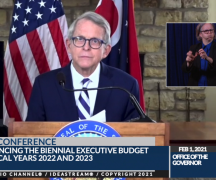BY MEGAN HENRY, Ohio Capital Journal
DAVID DUPONT, BG Independent News
Ohio Gov. Mike DeWine on Friday signed into law a massive higher education overhaul to ban diversity efforts, regulate classroom discussion, and prohibit faculty strikes, among other things. The law will take effect in 90 days.
S.B. 1 will set rules around classroom discussion, create post-tenure reviews, put diversity scholarships at risk, create a retrenchment provision that block unions from negotiating on tenure, shorten university board of trustees terms from nine years down to six years, and require students take an American history course, among other things.
For classroom discussion, the bill will set rules around topics involving “controversial beliefs” such as climate policies, electoral politics, foreign policy, diversity and inclusion programs, immigration policy, marriage, or abortion. S.B. 1 would only affect Ohio’s public universities.
Both State Sen. Theresa Gavarone, R-Bowling Green, and State Rep. Haraz Ghanbari voted in favor of the bill.
On Wednesday, after the Ohio Senate concurred to changes made to bill in the House, BGSU President Rodney Rogers sent a letter to the BGSU community.
The letter echoes the reassuring tone he struck on Tuesday when addressing the Faculty Senate.
[RELATED: Ohio higher ed overhaul will cost BGSU to make changes in every division of the university]
While acknowledging the challenges of making the changes required of the bill, including additional costs, he said the bill was a landmark in codifying certain principles: “free speech in our classrooms, academic freedom and opportunity for all.“
He continued: ” Let me be clear – we unequivocally agree, as the bill states, that institutions of higher education should, ‘treat all faculty, staff, and students as individuals, hold every individual to equal standards, and provide those individuals with equality of opportunity, with regard to those individuals’ race, ethnicity, religion, sex, sexual orientation, gender identity, or gender expression.'”
He urged those in the BGSU community to “demonstrate the power of a strong learning community to listen, engage and debate diverse viewpoints in a respectful and authentic manner.”
The university will offer a chance for such discussions as the semester winds down.
(See the entire letter below)
David Jackson, a political science professor and president of the BGSU Faculty Association, responded by text. “Among other terrible things, SB1 is the worst union busting bill since SB5. It will also make it more difficult for universities like BGSU to attract, retain, and graduate our students. This bill should never have been passed and signed.”
(SB5 was a 2011 bill that curtailed collective bargaining for public service employees. The bill was later repealed through a referendum with 62% of voters opposing enactment of the legislation.)
The bill moved quickly through the Statehouse. State Sen. Jerry Cirino, R-Kirtland, introduced S.B. 1, which passed the Ohio Senate in February and the Ohio House in March. Cirino introduced a nearly identical bill during the last General Assembly that went through several revisions, but the bill never made it the House floor and ultimately died.
The bill received overwhelming opposition from college students and professors. More than 1,500 people have submitted opponent testimony against the bill. Hundreds of students around the state have protested against the bill. Students and faculty have said they would leave Ohio if the bill becomes law.
President Rodney Rogers March 26 message to the BGSU community about Senate Bill 1.
Today, elected representatives in the Ohio Legislature passed Senate Bill 1, which establishes broad implications for Ohio’s public institutions of higher education specific to diversity, equity and inclusion, among other topics. If you have not yet read SB1, The Advance Ohio Higher Education Act, I encourage you to do so. The bill now goes to Gov. Mike DeWine, and if signed into law, provisions will begin to take effect in 90 days.
Over the past several months, we have been gathering information and engaging in conversations with elected representatives and constituent groups to better understand this legislation, and I want to provide an update about what is, and is not, happening at Bowling Green.
Certainly, SB1 will require changes to our processes across several areas, including the Board of Trustees, academic and faculty affairs, enrollment, student engagement, human resources, finance and administration and University communications. As with any governmental oversight, it will create additional administrative layers and costs to ensure compliance.
However, SB1 also codifies into state law many of our core educational principles: free speech in our classrooms, academic freedom and opportunity for all. Let me be clear – we unequivocally agree, as the bill states, that institutions of higher education should, “treat all faculty, staff, and students as individuals, hold every individual to equal standards, and provide those individuals with equality of opportunity, with regard to those individuals’ race, ethnicity, religion, sex, sexual orientation, gender identity, or gender expression.” We also believe that it is vital not to prohibit “faculty or students from classroom instruction, discussion, or debate, so long as faculty members allow students to express intellectual diversity.” In some ways, codifying aspects of academic freedom for public universities into state law is a milestone.
As we review our processes in anticipation of the implementation of SB1, we will be guided by these fundamental, common-sense principles that have long defined Bowling Green. We are a university that is proud to be measured by the success of all we include, emphasizing our commitment to access to higher education and a learning community where all can belong. In fact, it was in that very spirit that this spring semester, we hosted several large-scale events open to all members of the BGSU community that celebrated important elements of our country’s rich history and culture. While SB1 may require some organizational changes, as a lean organization, we have long focused our support efforts on student success and providing opportunities for all, and we believe the law will not stop us from continuing to do so.
Lastly, I recognize how deeply personal these conversations, and potential changes, are for some members of our learning community, and understandably, this can cause strong personal and emotional reactions. We absolutely welcome dialogue and discussion on all issues, including and especially those that impact our learning community, but let us not turn our emotion against one another; instead, let us demonstrate the power of a strong learning community to listen, engage and debate diverse viewpoints in a respectful and authentic manner.
In the coming weeks, we will offer opportunities for members of the campus community to share their thoughts and participate in discussions regarding the implementation of SB1. I encourage you to engage in this process, as this feedback will be particularly valuable for understanding the impact of the law on the operations of the University, as mentioned above.
While this is a time of change among higher education, Bowling Green will continue to foster a learning environment where all can belong, we will continue to support free speech, as enshrined by our Constitution and SB 1, we will continue to remain committed to academic freedom and shared governance, and we will, above all, continue to support our students, faculty and staff in the learning experiences that a public university like Bowling Green has long provided.




